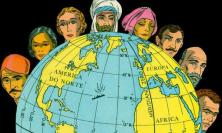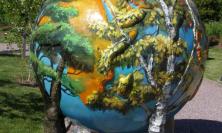‘The Holy Spirit can be said to possess an infinite creativity, proper to the divine mind, which knows how to loosen the knots of human affairs, including the most complex and inscrutable’, writes Pope Francis in Laudato si’. This Easter, Thinking Faith will be exploring how the gifts of the Holy Spirit can help us to co-operate in the loosening of those knots. Ruth Holgate begins our series as she asks: how might the gift of wisdom help us to untie the complicated knot of responding to the ‘cry of the earth and the cry of the poor’ as individuals and as communities?
In popular culture there is an approach to the concept of ‘gift’ as a superpower. In comics, films and novels there are many examples of what such special gifts can look like. We see an ordinary person receiving an extraordinary ability that is somehow added on to their human nature through a spider bite, a bang on the head or radioactive exposure. But gifts of the Holy Spirit at not superpowers that are somehow bolted on to a person, rather they are gifts that work in and through a person as they are, through their ordinary abilities and experience. Such gifts, then, are not as easily identifiable as obvious superpowers – Spidey senses, boulder-cracking strength, mind-reading – rather they are identified by their fruits, through the reflective sifting of experience that we call discernment of spirits. Galatians 5:22-23 offers us a list of these fruits of the spirit, experiences that may point to the presence and action of the Holy Spirit in our lives: love, joy, peace, patience, kindness, goodness, faithfulness, gentleness and self-control. But what does it mean to receive a gift of the Holy Spirit?
It might seem as if we need to have received the first of the gifts of the Holy Spirit in order to answer that question: wisdom. In storytelling, wisdom is often a characteristic of some people in old age – we hear about a sage old woman or man, picturing some wizened figure who has seen a lot of life and learned through often painful experience what is and is not a good approach to the challenges we encounter. However, we know that it is not necessarily the case that experience brings wisdom, indeed it can have quite the opposite effect, as pain and disappointment in life can produce bitterness and a defensive, closed-minded attitude. And even if wisdom were directly correlated with age, would this mean we have to wait until we reach a certain milestone or level of experience before we have any hope of acquiring it? Are we doomed to make poor decisions, to misunderstand our lives, to lack good judgment until we reach late middle age, perhaps, or older?
If you look for a secular definition of wisdom, there seems to be broad agreement that it consists in some combination of knowledge, good judgment, insight and common sense; but when we seek to find these things, as we often do, from the internet, books or other people, the ‘wisdom’ we find can be contradictory and overwhelming. If I ask how I should be living my life today given the ecological crises in the world, for example, I might be offered any and all of the following answers:
- work hard, earn money to buy insurance and provide security for yourself and your family;
- look after yourself and your health, and treat others as you wish to be treated;
- give away all you have and serve the poor;
- reduce, reuse, repair, rot, recycle.
How do I know which of this advice to follow, when it all contains ‘wisdom’ in its own way?
The Christian tradition adds something to these ideas to help us understand what wisdom is. Wisdom not only functions as something that gives us a deeper understanding of how the world works, of how we find can meaning in our flawed, challenging and confusing lives; and as something that may be acquired over time and through experience: it is a gift of the Holy Spirit. In one of a series of homilies in 2014, Pope Francis links receiving the gifts of the Holy Spirit to intimacy with God, to a relationship with God that transforms a person and draws them ever more into God’s love and action in the world. Such a relationship with God is available to everyone no matter their age, state of life or situation, and while we can indeed meet older friends of God who exhibit wisdom, they do not have a monopoly on this gift of the Holy Spirit, which blows where it will.
Pope Francis ties the gift of wisdom to a person’s intimate relationship with God in this way:
And wisdom is precisely this: it is the grace of being able to see everything with the eyes of God. It is simply this: it is to see the world, to see situations, circumstances, problems, everything through God’s eyes. This is wisdom. Sometimes we see things according to our liking or according to the condition of our heart, with love or with hate, with envy ... No, this is not God’s perspective. Wisdom is what the Holy Spirit works in us so as to enable us to see things with the eyes of God. This is the gift of wisdom.[i]
What an extraordinary claim, that a person can see things from God’s perspective! How on earth do we get into the mind of God? This is, of course, impossible: God’s perspective, God’s intentions, God’s actions are so far beyond our comprehension that we cannot fully grasp them. And yet, we are invited into relationship with this same ineffable God, and we are assured that through this relationship the Holy Spirit is active in our lives and knowable through its gifts and their fruits.
In his Spiritual Exercises, St Ignatius offers a few preparatory instructions for a time of prayer, one of which invites us, before we go to pray, to: ‘stand for the length of an Our Father … raise my mind and think how God our Lord is looking at me’[ii]. As we prepare for prayer, we consciously stop and try to see ourselves from God’s perspective. In performing this short exercise, we are bringing together what we know of God, our previous experiences in prayer and life that have spoken to us of God, and our current desires, hopes, fears and intentions. This can offer us an honest reflection on ourselves but also a sense of God’s unconditional love and attention to us in that moment – and it can produce surprising insight and reaction. This is not a sudden private revelation, a direct communication from God of some deep truth, but it can be a revealing moment of intimacy with our creator … and we can know it by its fruits.
Asking ourselves how God sees us, or how God regards a particular challenge or ‘knot’ in our lives, is not to start an internal theological debate, but to invite an honest moment of communication with God in which we hope and trust that God might respond. We may well hope for a very clear, straightforward response from God – how much easier it would be if God tweeted, emailed or texted us with words of wisdom that untied our knots or showed us clearly what decision we should make. Alas, that is unlikely. Instead, we are invited into a more reflective sifting of our inner experience, as we identify those fruits of the Holy Spirit that may indicate a response, a direction, a different perspective on the situation.
Let us consider how such an approach might help to loosen that particular knot in all of our lives that I mentioned previously, our need for ecological conversion – to respond urgently, as individuals and as the whole human race, to the ‘cry of the earth and the cry of the poor’. When a person looks at the mess human beings have made of the world, the climate crisis, the extreme inequality between peoples, a culture of careless over-consumption, etc., how can considering God’s perspective help us to respond? We might initially guess that God is sad or angry at what we have done, inducing feelings of guilt, helplessness and a sense of being paralysed – after all, what can one person do in this awful mess? But if we sit longer with the question of how God sees things, perhaps we recall God as creator, as creative, as one who lovingly attends to the world. We may want God to intervene to make things right – but we also notice as we grapple with these thoughts that God invites us to notice our own sense of wonder at creation, perhaps the delicate blossom on a tree or the surprising amount of busy, noisy birdlife in a local park. As we attend to the creation we see around us, we might notice within ourselves a desire to care, to act more gently toward this created world, to exercise more self-control over our own consumption, recognising that we do have an impact on the created world, however small. Over time, as we continue to dwell on how God sees things, our perspective can change, can become more attuned to those fruits of the spirit that can point us toward a greater care for others and for our world, and this wisdom will enable us to face small and great challenges.
Ruth Holgate is a member of the Jesuit Young Adult Ministries team, based at the Laudato Si’ community in Clapham.
[i] Pope Francis, General Audience (9 April 2014): http://www.vatican.va/content/francesco/en/audiences/2014/documents/papa-francesco_20140409_udienza-generale.html
[ii] George Ganss SJ (trans.), The Spiritual Exercises of Saint Ignatius (Loyola Press, 1992), §75.






